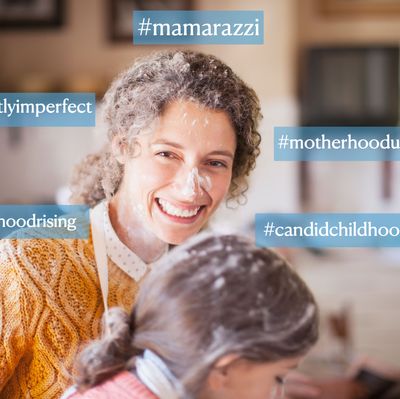
Over the past year I’ve noticed a shift in tone among the mom-influencers I follow on social media. They’re fed up with feeling judged by other moms. Other moms — ordinary moms like me, it would seem — are full of negative feedback about their choices. But no matter, because these moms want to reclaim and celebrate their flaws. They’re #perfectlyimperfect members of the #motherhoodrising #mamarazzi and they’re sharing their authentic, unfiltered #motherhoodunplugged, #candidchildhood moments. There are nothing but good intentions behind these hashtags, but as I’ve scrolled through them, I’ve pondered the obvious question: This is supposed to be imperfect? Did someone move the goalposts and forget to tell me?
Initially #perfectlyimperfect caught my attention because as a phrase it contains a bit of awkward defensiveness, which suggests that there’s some unexamined messiness below the surface. It also raises an important question: Can today’s version of online motherhood imagine an existence outside the binary of “perfect” and “imperfect”?
Since the first mommy blogs of the early aughts, online motherhood has come a long way. If you were to take a paleontological approach and classify online motherhood into ages, you might break it down like this: the Confessional Age (2001–2009ish), the Early Sponcon Age (2009–2015ish), the Influencer Age (2015–2018), and now, the Perfectly Imperfect Age. Each age is a response to the one that came before it, and just like technology itself, the ages are accelerating, each becoming a little shorter than the last. Online motherhood is made of many diverse subcultures, but even as each subculture has its own history, these broad ages have shaped them all.
During the Confessional Age, mothers like Heather Armstrong of Dooce.com and Jill Smokler of Scary Mommy were blogging in a revolutionary confessional mode, using the new web 2.0 platform to create community and share experiences in a way that had never been possible before. Their radical honesty — about the frustrations and fears of new parenthood, postpartum depression, sustaining a marriage, dividing domestic labor, breastfeeding, boredom — was a direct response to the prevailing tone of motherhood media throughout the 20th century, which had largely been cheerful, prescriptive, and patriarchal (think advice for housewives like “Speak in a low, soothing and pleasant voice” to your husband). When Heather Armstrong had her then-husband Jon post a note she had handwritten from her hospital bed, where she was receiving treatment for postpartum depression, it was clear something had shifted permanently. When Scary Mommy introduced its anonymous “Confessions” tab, where readers could confess and give each other virtual hugs, the confessions crashed in. Mommy blogs, in these early days, felt like the workers seizing the means of production.
Let’s mark the start of the Early Sponcon Age in 2009, around the time that Ree Drummond, a housewife and mother of three from Oklahoma, published her first cookbook, The Pioneer Woman Cooks: Recipes From an Accidental Country Girl. At that time, Drummond was making more money than most of her readers (including me) knew about, but that was about to change, and so was her site. It veered away from endearingly long-winded recipes for Chex Mix and toward shorter, more streamlined posts that often directed readers to other products being developed and sold by her ever-expanding brand. Now she has an entire lifestyle brand — including a Food Network show with 22 seasons — based on a signature aesthetic. Other bloggers of this age, like Jenny Lawson of the Bloggess and Glennon Doyle of Momastery, began their blogs around this time and published best-selling memoirs based on their blogs’ success within several years.
Next came the Influencer Age, characterized by Love Taza, Barefoot Blonde, LaTonya Yvette, Oh Joy, and so many other mommy blogs turned lifestyle brands. The Influencer Age brought about the Insta-perfect life that everyone knows is painstakingly staged, but that we love to follow — and critically dismantle — anyway. “Just a cozy Sunday relaxing with the kids!” claims the Influencer Age, after having spent 45 minutes prepping the shot. Which brings us to today, and the Perfectly Imperfect Age.
This trend is a direct response to the degree of visual perfection required of your average Instagram influencer, a rebuttal to the beauty and lifestyle ideals that characterize traditional women’s media representations of beauty and success. No single influencer seems to have made “perfectly imperfect” her own; it seems instead to be bubbling up into the discourse from the aspiring-influencer moms with smaller followings. (Unlike the ages that precede it, the Perfectly Imperfect Age hasn’t been fully monetized — yet.) The subject of a recent Elle feature by Molly Langmuir, the Unicorn Mom community is a product of the Perfectly Imperfect Age: a group of women who eschew “judgmental moms” while enforcing clear guidelines about who does and doesn’t fit their mold. As Langmuir pointed out, there’s an Urban Dictionary definition: “A mother who’s not perfect, enjoys alcohol, has a sense of humor, and couldn’t care less what you think.”
“Nonjudgmental,” however, is not an ideologically neutral concept. “Nonjudgmental” defines itself by what it’s not, thereby implying a judgment. Nonjudgmental moms aren’t helicopter moms (those sad women who can’t leave their kids alone and live their own lives!), they aren’t attachment-parenting moms (again — live a little, ladies!), and they aren’t the type to insist that their kids only eat organic. Right in line with “perfectly imperfect,” “nonjudgmental” is meaningless without the thing it claims to reject.
“Perfectly imperfect” claims to reject the trap of perfectionism, and often appears alongside stories about a “journey” to self-acceptance, or a triumph over adversity. It’s often used to describe an overall approach to life: Forget the happy homemaker routine and embrace the chaos and love of your family life as it already is.
But let’s not get ahead of ourselves here — she’s still a mom. In fact, she’s mom as fuck. Her maternal instincts are so honed, so visceral, she’s borderline terrifying. But also beautiful. On the inside AND on the outside. She’s caffeinated, motivated, hyperorganized, yet also soulful and vulnerable. She is all of these things and then some. Sometimes it’s hard to keep it all straight. The kids aren’t always smiling in the photos — we all know how hard it is to get them to pose. The perfectly imperfect mom loves her kids’ grimaces, and you can tell because she never fails to smile at them.
The #perfectlyimperfect mom may not be perfect, but she has tried very, very hard to be — and is making peace with her “limitations.” These limitations define a new set of boundaries about what is and isn’t admissible within the definition of “good motherhood.” The birthday cake you lovingly made for your son that came out adorably lopsided? Perfectly imperfect. Your soft post-baby body, encased in brand-new Lycra, on its merry way to the gym? Perfectly imperfect! Showing up late to pick your kids up from school because your boss kept you late at work? Hmm. Maybe keep that one to yourself. Burning dinner and serving it to an unhappy family after you lash out from your own self-loathing? That’s more of a private moment, no?
#Perfectlyimperfect’s internal contradiction is meant to be a clever joke, but like so much of online motherhood, it has political implications. Most images that are tagged with #perfectlyimperfect or #motherhoodunplugged represent conventionally “perfect” women — attractive, carefully groomed, usually white, posing for selfies that reinforce many of the same old beauty and femininity norms that have dogged women since the dawn of time. Online motherhood has always contained its share of disingenuousness disguised as relatability, and this is the latest version.
But while the early mommy bloggers were defining themselves in response to patriarchal power structures that were repressing and isolating them, the Perfectly Imperfect Age seems to be defining itself in response to … other moms. The revolution has become a civil conflict. Why can’t we make peace? Are moms really that mean to each other on social media? Can’t we just close the comments, like Heather Armstrong did on Dooce, and move on?
The Perfectly Imperfect Age suggests that as moms, we can’t see over the fence of perfection — that there might not even be anything on the other side. Perfectly Imperfect takes us back to the mid-20th century, when women were expected to be self-deprecating while striving to meet punishing social expectations. Even when we’re trying to imagine a different way of representing ourselves on social media, a way that doesn’t emulate the influencer aesthetic, we’re still in conversation with perfectionism. We’re still looking over our shoulders at “perfection,” worrying about it, measuring ourselves against it. By defining ourselves as imperfect, perfection continues to set the tone of our conversations.
We’ll probably always use social media to show off and burnish our images. Why shouldn’t we? It’s fun. But flexing isn’t the only fun part of performing an online identity. There’s also a creative opportunity, a way to narrate ourselves into being. Social media can feel like a cruel panopticon, but storytelling can be emancipation — it was in the early days of mommy blogging. I hope the next time online motherhood reinvents itself, it will be again.





